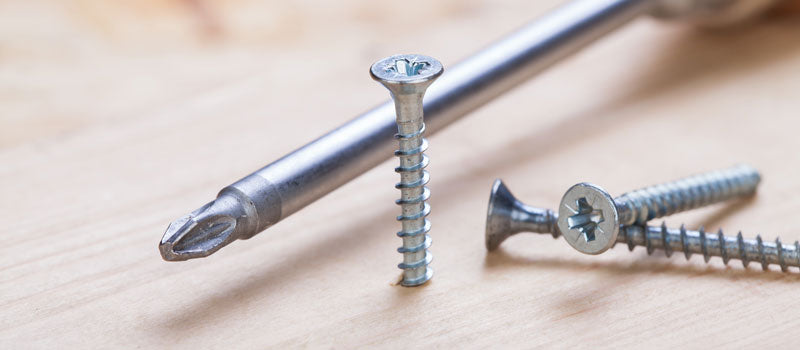
Understanding Different Types of Screw Heads and Drive Types
When starting a new construction project, choosing the type of screw to use is essential. Each screw head and drive style is unique and recommended for different applications. To help you better understand what screws are the perfect fit for your next job, Fasteners Plus is here to give a clear explanation of the screw heads and drive types available.
Why are There So Many Screw Heads?
The oldest and one of the most common screw heads is slotted. This screw is used with a flathead screwdriver. Although it is commonly used, the screw head can be easily damaged and the blade of the screwdriver can easily slip out of the slotted head.
With there being disadvantages to this screw head, manufacturers set out to create screws with heads that have better functionality for a wider range of applications and industries. The slotted screw and Phillips head are typically the most universally used in the United States. Having so many options available is perfect for being able to find a screw that is going to fit your specific application.
Types of Screw Heads
The large variety of screw heads are categorized as countersunk screws or non countersunk screws.
Countersunk Screw Heads
Countersunk screw heads feature an angular shape under the head of the screw. The countersunk head allows for flush installation into the material for a clean, finished appearance.

Types of countersunk screw heads include:
- Flat Head- Flat head screws install completely flush with the material’s surface. These are used in the construction industry for many projects including cabinets, countertops, stairs, furniture, and more.
- Oval Head- Oval head screws are a combination of a countersunk head and a domed head. Once installed, the screw head protrudes above the material’s surface and provides a decorative look.
- Bugle Head- Bugle head screws feature a shape that reduces damage to the material they are installed into. The head distributes stress evenly over a wider surface than flat head screws. Bugle head screws are commonly used for drywall, wood decking, and plasterboard applications.
Non-Countersunk Screw Heads
Non-Countersunk screws are flat under the head of the screw. Once they are drilled into the material, they are fully exposed on the surface.

Types of non-countersunk screws include:
- Binding Head- Binding screw heads are similar to pan heads and typically have a deep slot in the center of the head. They also have a prominent undercut beneath the head of the screw that provides space for wire connections. Binding head screws are great for electrical applications.
- Button Head- Button head screws have a rounded head design. They are commonly used for socket drive recesses and Torx drive recesses.
- Domed Head- Once installed, domed head screws sit nicely on the material’s surface with a decorative appearance.
- Pan Head- Pan head screws are the most common type of rounded screw head. They are perfect for applications that require a flat-bottomed screw. They are commonly used to secure metal components such as machinery and automotive parts and accessories.
- Round Head- Round head screws feature a thicker decorative head and provide an ornamental appearance once installed.
- Fillister Head- Fillister head screws have tall cylindrical sides and slightly rounded heads. The higher profile makes these heads better fit for deeper slots compared to pan or round head screws.
- Truss Head- Truss head screws have a wide, mushroom-shaped head. They typically have a lower profile and larger bearing surface than round or pan heads. This type of screw is commonly used in sheet metal applications.
- Flange Head- Flange head screws are available with circular or hex-shaped heads. They feature a circular flange directly under the head.
- Hex Head- Hex head screws allow for greater torque. They are typically installed with a wrench and socket. Hex heads are common in screws and bolts.
- Socket Cap Head- Socket cap screws feature a cylindrical head and are unique to socket drive recesses.
- Square Head- Square heads feature a square in the center of the head and are common for screws and bolts.
Screw Drive Types
Just like screw heads, there are many drive-type varieties. Screws require different drive types for proper installation and removal. The drive type on a screw typically consists of ridges in the screws head. Once you insert the correct screwdriver or drill bit into the head of the screw, it will dig into these ridges to help you turn the fastener.

Drive Types/Recesses Include:
- Slotted- slotted drive screws are very commonly used and easy to find. The slotted recess has a straight line through the middle of the screw's head. Flathead screwdrivers or drills with flathead bits are compatible. Slotted screws are common for projects where minimal torque is required.
- Phillips- The Phillips drive design performs better with screwdrivers than the slotted drive because it has four contact points. The cross-shaped drive allows for more torque to ensure a tighter fit.
- Tamper Resistant Phillips- The Phillips tamper-resistant drive is similar to the traditional Phillips drive. The difference is that it includes a small pin in the center of the screw drive. It requires a specific tool to install and remove it. This drive type is great for high-security applications.
- Combination- Combination drive screws are a versatile option. This is because you can use both slotted and Phillips screwdrivers in this recess.
- Hex external- External hex screws require a compatible wrench or socket to install. This type of drive recess can get great leverage since you turn the entire drive from the edges of the screw.
- Hex internal- Hex internal screws must be used with a matching size Allen wrench to install.
- Tamper Resistant Hex- Tamper-resistant hex drives are tamper resistant with a small pin in the center of the drive. A special tool is required to remove these screws.
- Square- Square recess screws have a square-shaped socket in the center of the screw head. They are also slightly tapered making installation easy. The compatible tools are easy to insert and rarely slip out of place.
- Tamper Resistant Square- Tamper-resistant square recess is similar to traditional square recess screws. The main distinction is the small pin in the center of the drive. This pin successfully prevents tampering. A special tool is required to remove these screws.
- Quadrex- Quadrex screw drives are a more unique drive compared to some of the options available. This drive type is a combination of Phillips drives and square recess drives. They can be installed and removed with a standard Robertson, Phillips tool, or a quadrex tool.
- Pozidriv- Pozidriv screw drives are similar to Phillips drives but have four more contact points. They provide better mating with the driver, reduced cam-out, and more efficient installation.
- Torx- Torx drives have a six-pointed star shape. Torx drives are commonly used in the construction and manufacturing of electronic products. They do a great job of preventing cam-out.
- Tamper Resistant Torx- Tamper-resistant Torx drives include a small pin in the center of the drive that prevents tampering. A special tool is required to remove these screws.
- Torx plus- Torx plus screws have smaller grooves in the drive compared to regular Torx drives. This allows tools to make better contact with the screw head to apply more torque.
-
Tamper Resistant Torx Plus- Tamper-resistant Torx plus drives have a five-point design with a small pin in the center of the drive. This drive type is great for high-security applications.
- Tri-wing- Tri-wing drives have three grooves that are slightly curved. The deep grooves in the screw allow for more torque than some of the other options available.
- Spanner- Spanner drives have two holes in the head of the screw that locks into a screwdriver or drill bit during installation. This screw is commonly used to avoid tampering.




